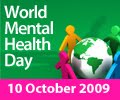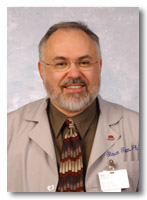Published: October 29, 2009
The BBC News features extracts from the controversial comedy performed by John Ryan at the Bernie Grant Arts Centre
How can you make jokes about people wanting to take their own lives?
This was comedian John Ryan’s challenge in “Cracking Up”, a comedy show about mental health.
John was asked by Surrey NHS Primary Care Trust if he would be interested in bringing some stand-up to a production they were developing about suicide, depression and anxiety. link to read more
Published: October 10, 2009

World Mental Health Day was started by the World Federation for Mental Health in 1992.
It is a unified effort to promote greater public awareness and understanding of mental health and mental illness. Every year, thousands of people across the world raise awareness and funds for mental health causes.
The World Health Organisation predicts that in 20 years time more people will be affected by depression than any other health problem.
“As well as reminding us of the importance of mental health on a personal level, World Mental Health Day is an opportunity to acknowledge how important psychological well-being is to our happiness and prosperity as a society. As we learn more about the way the human mind works, psychological therapies and psychosocial approaches to mental health are becoming more well-known and recognised as effective.”
See whats happening around the world and view the WFMH Newsletter
Published: October 9, 2009
 Steven M. Tovian, PhD, ABPP, is an assistant professor of psychiatry and behavioral sciences at the Feinberg School of Medicine at Northwestern University in Chicago. He is board certified in clinical health and clinical psychology and is in independent practice. He is the former chief psychologist and director of health psychology at the NorthShore University Healthcare System Medical Group. His work focuses on integrating health care – including mental health treatment in medical settings to improve overall health. To mark World Mental Health Day (Oct. 9), the American Psychological Association spoke with Dr. Tovian about the benefits of including psychologists in primary care and other medical settings and how this integration can lower costs for consumers and insurance companies.
Steven M. Tovian, PhD, ABPP, is an assistant professor of psychiatry and behavioral sciences at the Feinberg School of Medicine at Northwestern University in Chicago. He is board certified in clinical health and clinical psychology and is in independent practice. He is the former chief psychologist and director of health psychology at the NorthShore University Healthcare System Medical Group. His work focuses on integrating health care – including mental health treatment in medical settings to improve overall health. To mark World Mental Health Day (Oct. 9), the American Psychological Association spoke with Dr. Tovian about the benefits of including psychologists in primary care and other medical settings and how this integration can lower costs for consumers and insurance companies.
What is integrated health care? [continue reading…]
Published: September 25, 2009
At the World Congress on Psychosomatic Medicine in Torino, Italy, Carol Ryff, Professor of Psychology at the University of Wisconsin, has described how more than simply feeling happy, it is the personal approach to psychological well-being that matters.
Increasingly, researchers attend to both positive and negative aspects of mental health. Such distinctions call for clarification of whether psychological well-being and ill-being comprise opposite ends of a bipolar continuum, or are best construed as separate, independent dimensions of mental health. Biology can help resolve this query – bipolarity predicts ‘mirrored’ biological correlates (i.e. well-being and ill-being correlate similarly with biomarkers, but show opposite directional signs), whereas independence predicts ‘distinct’ biological correlates (i.e. well-being and ill-being have different biological signatures). Multiple aspects of psychological well-being (eudaimonic, hedonic) and ill-being (depression, anxiety, anger) were assessed in a sample of aging women (n = 135, mean age = 74) on whom diverse neuroendocrine (salivary cortisol, epinephrine, norepinephrine, DHEA-S) and cardiovascular factors (weight, waist-hip ratio, systolic and diastolic blood pressure, HDL cholesterol, total/HDL cholesterol, glycosylated hemoglobin) were also measured. Measures of psychological well-being and ill-being were significantly linked with numerous biomarkers, with some associations being more strongly evident for respondents aged 75+. Outcomes for seven biomarkers supported the distinct hypothesis, while findings for only two biomarkers supported the mirrored hypothesis. This research adds to the growing literature on how psychological well-being and mental maladjustment are instantiated in biology. Population-based inquiries and challenge studies constitute important future directions.
Prof. Carol Ryff also illustrated the findings of an Italian group headed by Professor Fava to point to the fact that psychological well-being can be learned and that increasing psychological well-being may improve long-term outcome of depression.
Source: Psychotherapy and Psychosomatics: Carol D. Ryff, Gayle Dienberg Love, Heather L. Urry, Daniel Muller, Melissa A. Rosenkranz, Elliot M. Friedman, Richard J. Davidson, Burton Singer. Psychological Well-Being and Ill-Being: Do They Have Distinct or Mirrored Biological Correlates? Psychother Psychosom 2006;75:85-95
 Steven M. Tovian, PhD, ABPP, is an assistant professor of psychiatry and behavioral sciences at the Feinberg School of Medicine at Northwestern University in Chicago. He is board certified in clinical health and clinical psychology and is in independent practice. He is the former chief psychologist and director of health psychology at the NorthShore University Healthcare System Medical Group. His work focuses on integrating health care – including mental health treatment in medical settings to improve overall health. To mark World Mental Health Day (Oct. 9), the American Psychological Association spoke with Dr. Tovian about the benefits of including psychologists in primary care and other medical settings and how this integration can lower costs for consumers and insurance companies.
Steven M. Tovian, PhD, ABPP, is an assistant professor of psychiatry and behavioral sciences at the Feinberg School of Medicine at Northwestern University in Chicago. He is board certified in clinical health and clinical psychology and is in independent practice. He is the former chief psychologist and director of health psychology at the NorthShore University Healthcare System Medical Group. His work focuses on integrating health care – including mental health treatment in medical settings to improve overall health. To mark World Mental Health Day (Oct. 9), the American Psychological Association spoke with Dr. Tovian about the benefits of including psychologists in primary care and other medical settings and how this integration can lower costs for consumers and insurance companies.
